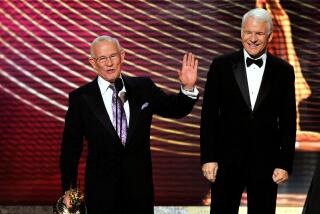Bad intros: the greatest hits
Tommy Smothers used to get a laugh on stage by introducing the other half of the act, his brother Dick, with the words, “The person to my left needs no introduction.” Followed by a long pause -- and no introduction.
Mahmoud Ahmadinejad should have been so lucky Monday when Columbia University President Lee Bollinger secured himself a spot in the toastmaster hall of fame by introducing his guest as “a petty and cruel dictator.”
Some cheered Bollinger’s frankness, while others winced at his boorishness. But for those of us who occasionally speak for a living, the event carried mainly the shock of recognition. The president of Iran had just been subjected to every public speaker’s worst nightmare -- the bad introduction.
All speakers have their favorite horror stories of the introduction from hell. Bob Dole tells the story of the time he was introduced as a man who’s “interesting even when he doesn’t have anything to say.”
Cornelia Otis Skinner was once introduced with the slightly-too-honest admission, “Since we cannot afford Admiral Byrd on this occasion, we are having Cornelia Otis Skinner instead.”
My own involves a host who gave an interminable, rambling introduction that began, “You think your husband’s a nut -- wait till you hear this guy!” and went downhill from there. The lesson I learned, which I freely pass on to Ahmadinejad, is rule No. 1 for public speaking: Supply your own introduction.
Mark Twain, perhaps the leading speaker of his day, went one better to avoid the perils of the bad introduction -- he insisted on introducing himself, saving the trouble, he said, of having to train others to do it right.
There are rules for introducers as well, of course, and Bollinger broke several. The first, inviolate rule is: Never upstage the speaker. The introducer’s role is that of catalyst, not newsmaker. The second rule, until Monday thought so obvious that it goes without saying, is: Don’t insult the speaker. Bollinger’s introduction was akin to pulling the welcome mat out from under his invited guest. While he was standing on it. And the neighbors were watching.
Eighty-five years ago, Emily Post wrote, “New York’s bad manners are often condemned and often very deservedly.” Ahmadinejad would surely agree, but he’d also appreciate a quip uttered a few years later by a New Yorker who made rudeness an art form, Groucho Marx:
“Do you suppose I could buy back my introduction to you?”
More to Read
The biggest entertainment stories
Get our big stories about Hollywood, film, television, music, arts, culture and more right in your inbox as soon as they publish.
You may occasionally receive promotional content from the Los Angeles Times.










